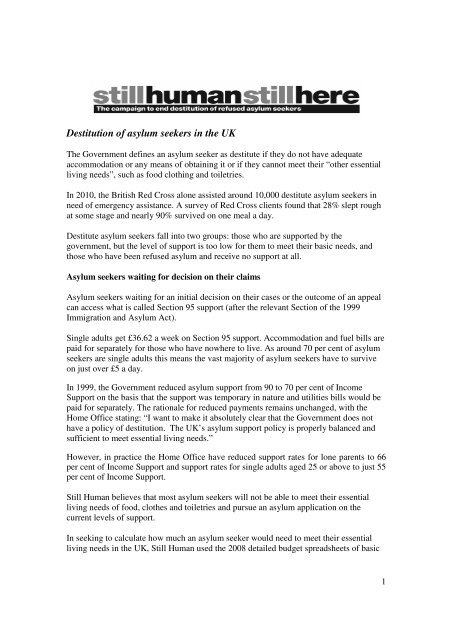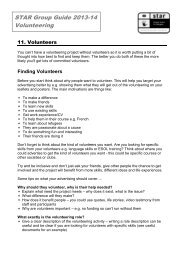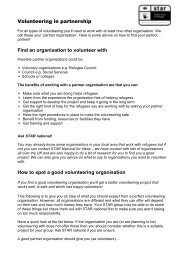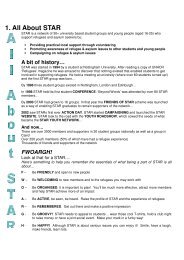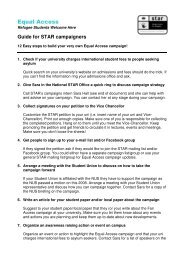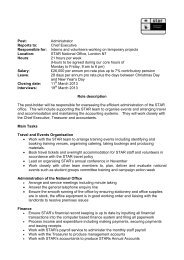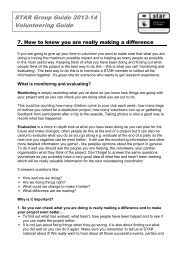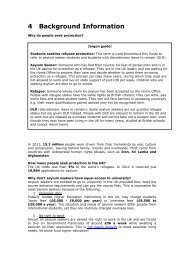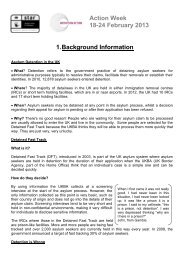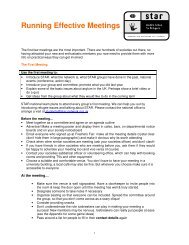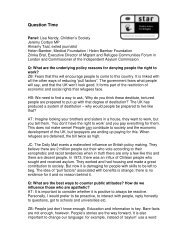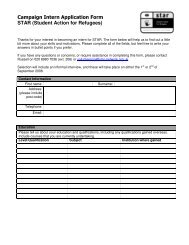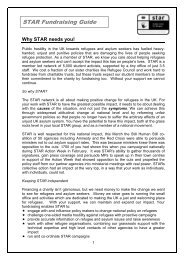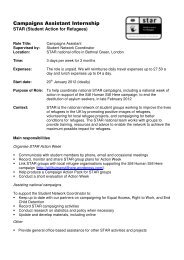Briefing on destitute asylum seekers
Briefing on destitute asylum seekers
Briefing on destitute asylum seekers
You also want an ePaper? Increase the reach of your titles
YUMPU automatically turns print PDFs into web optimized ePapers that Google loves.
Destituti<strong>on</strong> of <strong>asylum</strong> <strong>seekers</strong> in the UK<br />
The Government defines an <strong>asylum</strong> seeker as <strong>destitute</strong> if they do not have adequate<br />
accommodati<strong>on</strong> or any means of obtaining it or if they cannot meet their “other essential<br />
living needs”, such as food clothing and toiletries.<br />
In 2010, the British Red Cross al<strong>on</strong>e assisted around 10,000 <strong>destitute</strong> <strong>asylum</strong> <strong>seekers</strong> in<br />
need of emergency assistance. A survey of Red Cross clients found that 28% slept rough<br />
at some stage and nearly 90% survived <strong>on</strong> <strong>on</strong>e meal a day.<br />
Destitute <strong>asylum</strong> <strong>seekers</strong> fall into two groups: those who are supported by the<br />
government, but the level of support is too low for them to meet their basic needs, and<br />
those who have been refused <strong>asylum</strong> and receive no support at all.<br />
Asylum <strong>seekers</strong> waiting for decisi<strong>on</strong> <strong>on</strong> their claims<br />
Asylum <strong>seekers</strong> waiting for an initial decisi<strong>on</strong> <strong>on</strong> their cases or the outcome of an appeal<br />
can access what is called Secti<strong>on</strong> 95 support (after the relevant Secti<strong>on</strong> of the 1999<br />
Immigrati<strong>on</strong> and Asylum Act).<br />
Single adults get £36.62 a week <strong>on</strong> Secti<strong>on</strong> 95 support. Accommodati<strong>on</strong> and fuel bills are<br />
paid for separately for those who have nowhere to live. As around 70 per cent of <strong>asylum</strong><br />
<strong>seekers</strong> are single adults this means the vast majority of <strong>asylum</strong> <strong>seekers</strong> have to survive<br />
<strong>on</strong> just over £5 a day.<br />
In 1999, the Government reduced <strong>asylum</strong> support from 90 to 70 per cent of Income<br />
Support <strong>on</strong> the basis that the support was temporary in nature and utilities bills would be<br />
paid for separately. The rati<strong>on</strong>ale for reduced payments remains unchanged, with the<br />
Home Office stating: “I want to make it absolutely clear that the Government does not<br />
have a policy of destituti<strong>on</strong>. The UK’s <strong>asylum</strong> support policy is properly balanced and<br />
sufficient to meet essential living needs.”<br />
However, in practice the Home Office have reduced support rates for l<strong>on</strong>e parents to 66<br />
per cent of Income Support and support rates for single adults aged 25 or above to just 55<br />
per cent of Income Support.<br />
Still Human believes that most <strong>asylum</strong> <strong>seekers</strong> will not be able to meet their essential<br />
living needs of food, clothes and toiletries and pursue an <strong>asylum</strong> applicati<strong>on</strong> <strong>on</strong> the<br />
current levels of support.<br />
In seeking to calculate how much an <strong>asylum</strong> seeker would need to meet their essential<br />
living needs in the UK, Still Human used the 2008 detailed budget spreadsheets of basic<br />
1
goods which have been compiled by the Joseph Rowntree Foundati<strong>on</strong> as part of their<br />
research for minimum income standards in Britain and then took out items that would not<br />
generally be c<strong>on</strong>sidered essential to avoid absolute poverty. 1<br />
The basic goods included 56 food items which would provide a balance diet, a small<br />
number of clothes items, household cleaning items, toiletries, cold/flu remedies,<br />
paracetamol, ph<strong>on</strong>e charges (£1), travel costs and <strong>on</strong>e first class stamp. This analysis<br />
found that the minimum level of support (over and above providing housing and paying<br />
utility bills and council tax) required for a single adult <strong>asylum</strong> seeker to meet their<br />
essential living needs in 2009 would be just under £45 a week. This was the equivalent of<br />
70 per cent of Income Support in 2009.<br />
Refused <strong>asylum</strong> <strong>seekers</strong><br />
Refused <strong>asylum</strong> <strong>seekers</strong> who have had their appeal rejected have to leave their<br />
accommodati<strong>on</strong> and have their support cut off after 21 days. The main excepti<strong>on</strong>s to this<br />
are families with children who c<strong>on</strong>tinue to receive Secti<strong>on</strong> 95 support and those <strong>asylum</strong><br />
<strong>seekers</strong> who the Government accepts cannot return temporarily through no fault of their<br />
own (e.g. they have agreed to return voluntarily, they are too sick to travel or there is no<br />
route of return to their country).<br />
The latter group gets Secti<strong>on</strong> 4 support, but they receive £1.23 less than they did <strong>on</strong><br />
Secti<strong>on</strong> 95 support and it is delivered through a plastic payment card rather than in cash,<br />
making it impossible for <strong>asylum</strong> <strong>seekers</strong> to access vital services like making ph<strong>on</strong>e calls<br />
or taking buses. Most <strong>asylum</strong> <strong>seekers</strong> either do not meet the criteria for Secti<strong>on</strong> 4 support<br />
or do not apply for it because they are afraid to sign up for voluntary return.<br />
Still Human believes that many refused <strong>asylum</strong> <strong>seekers</strong> should have been granted some<br />
form of protecti<strong>on</strong> in the UK. This view is supported by the fact that in 2010, 27% of<br />
appeals were allowed. That is to say that in more than <strong>on</strong>e in four cases the UKBA got<br />
the initial decisi<strong>on</strong> wr<strong>on</strong>g. For some nati<strong>on</strong>alities the overturn rates <strong>on</strong> appeal were even<br />
higher. For example, 50% of Somalis w<strong>on</strong> their appeals in 2010 and 36% of Eritreans and<br />
Zimbabweans were also successful. However, success at appeal is largely dependent <strong>on</strong><br />
having good quality legal representati<strong>on</strong>, which is in increasingly short supply.<br />
The c<strong>on</strong>sequence of this is that some groups of <strong>asylum</strong> <strong>seekers</strong> are refused any form of<br />
status and come to the end of the process, but cannot be returned to their country of origin<br />
because it is not safe to do so. This was the case for Zimbabweans between 2002 and<br />
2011, with the excepti<strong>on</strong> of an eight m<strong>on</strong>th period in 2004. There were no removals<br />
during this time, but thousands of refused Zimbabwean <strong>asylum</strong> <strong>seekers</strong> were left <strong>destitute</strong><br />
and in limbo in the UK.<br />
Impacts of destituti<strong>on</strong><br />
1 The minimum level is about needs, not wants and was identified by the UK general public. The groups<br />
who came up with this definiti<strong>on</strong> were drawn from all walks of life: www.minimumincomestandard.org<br />
For the full budget spreadsheets see: http://www.minimumincomestandard.org/budget_summaries.htm<br />
2
The current policy leaves people with either inadequate support or completely <strong>destitute</strong>,<br />
but prohibits <strong>asylum</strong> <strong>seekers</strong> from working to support themselves unless they have been<br />
waiting for an initial decisi<strong>on</strong> <strong>on</strong> their claim for more than <strong>on</strong>e year. It causes severe<br />
hardship for the individuals affected and leads to a higher incidence of physical and<br />
mental health problems, with c<strong>on</strong>sequent costs for the NHS.<br />
Destituti<strong>on</strong> also forces <strong>asylum</strong> <strong>seekers</strong> to find other survival strategies like illegal work,<br />
prostituti<strong>on</strong>, begging or street homelessness – all of which have social and financial<br />
c<strong>on</strong>sequences for policing, local authorities and the voluntary sector. In additi<strong>on</strong>,<br />
destituti<strong>on</strong> makes voluntary returns more difficult as people cannot properly c<strong>on</strong>sider<br />
return when they are focused <strong>on</strong> day to day survival.<br />
Proposed policy soluti<strong>on</strong>s<br />
There is less pressure <strong>on</strong> the <strong>asylum</strong> system than there has been for more than 15 years.<br />
This is due to the fall in <strong>asylum</strong> applicati<strong>on</strong>s which have fell to less than 18,000 in 2010 -<br />
the lowest level since 1989. This gives us the opportunity to make the system work in a<br />
humane, efficient and fair way. As part of this process the Government should:<br />
• Ensure that all <strong>asylum</strong> <strong>seekers</strong> who would otherwise be <strong>destitute</strong> are adequately<br />
supported from the point of applicati<strong>on</strong> until they are either given status or<br />
returned to their country of origin.<br />
• Provide <strong>asylum</strong> <strong>seekers</strong> with support rates equivalent to at least 70% of Income<br />
Support, paid in cash. The support rate for l<strong>on</strong>e parents should be increased to<br />
70% of Income Support immediately as they are a particularly vulnerable group.<br />
• Link all future annual increments for <strong>asylum</strong> support to annual increments to<br />
Income Support rates.<br />
• Grant <strong>asylum</strong> <strong>seekers</strong> permissi<strong>on</strong> to work if their cases have not been resolved in<br />
6 m<strong>on</strong>ths or they have been refused but cannot be removed through no fault of<br />
their own.<br />
3


